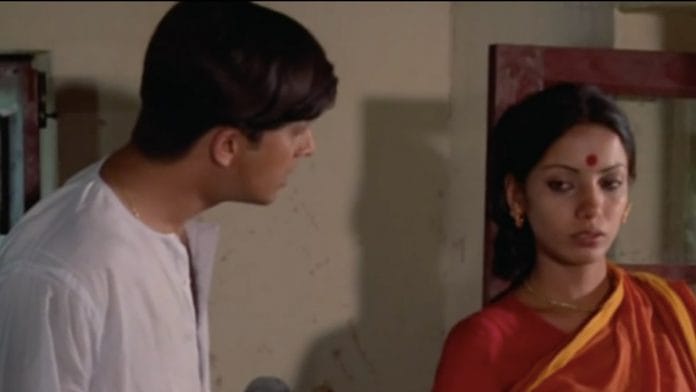New Delhi: A few pieces of cinema stay with you a long time after watching them and Shyam Benegal’s Ankur (1974) is one such film. It is special for many reasons, not least because it won three National Awards. Ankur was Benegal’s first feature film and also officially introduced, Shabana Azmi, Anant Nag and Priya Tendulkar to the Hindi silver screen.
Since Azmi’s birthday and Priya Tendulkar’s death anniversary were observed this past week, ThePrint rewinds to this now-classic film that made the country introspect.
A hard look at the caste system
Ankur takes a hard look at the entrenched caste system in our society. It stars Azmi as Lakshmi, a poor Dalit woman who lives in rural Andhra Pradesh with her unemployed husband, who is hearing and speech impaired.
The local zamindar of the village sends his newly married son, Surya (Nag), to manage a piece of farmland. Surya dislikes his father because he was forced to join the family business, and for siring an illegitimate child.
Reluctantly, Surya obeys his father. He employs Lakshmi and her husband to work for him in the village. Surya lives alone because his new bride (Tendulkar) is still a child.
He soon finds himself attracted to Lakshmi, who struggles to deal with her alcoholic husband. Their affair does not go unnoticed, and soon the entire village begins gossiping about them and ostracises Lakshmi. Things take a turn for the worse, when Surya’s wife comes to stay with him.
A multi-layered and nuanced film
Ankur is a layered film and deals with issues of caste, sexism, patriarchy, privilege, hypocrisy, the ironies and vagaries of human nature, in an extremely nuances manner.
The fact that Lakshmi is a Dalit is starkly present in every scene. She is shunned by the villagers and even herself. When Surya asks her to make tea and cook for him, she refuses, saying he can’t touch anything she has made.
Surya’s privilege as an upper-caste, educated, rich man is equally apparent, as he brushes away the issue of discrimination easily and orders people around to do work he has very little knowledge of.
It is Lakshmi’s story
While the story centres on Lakshmi and Surya’s interactions, it is Lakshmi’s story through and through. Her character arc is brilliant — she accepts the fact that she is downtrodden but even in the injustice of her everyday life, she holds her own.
When Surya makes an advance, she is startled. She knows that if he pushes further, she will have to give in because she has been taught that her voice did not matter. Despite this, she stands up for herself and makes it clear that his move is unwelcome.
Lakshmi watches with tears in her eyes as another woman in the village is ostracised for having an affair and later commits suicide. The unfairness stings as she realises how little agency she has as a woman. Once she grows close to Surya, she begins to feel guilty about being unfaithful to her husband and yet she has the courage to consider putting her desires first.
Lakshmi does not desire the big things in life. All she wants is a child and her husband, and to earn an honest living. But being a lower-caste woman, she understands that the odds are stacked up against her and struggles to come to terms with them.
Benegal’s talent lay in bringing out the subtleties of Lakshmi’s character and Surya’s slow maturity. He also deftly depicts the various issues plaguing this part of India, especially in the contrast between Azmi and Nag’s roles and how well each is played.
Ankur may not be an easy watch, but it is a necessary one. The language of patriarchy still pervades every aspect of our lives, women are still treated as property and Dalits are still subjected to horrifying violence.
The more things change, the more they remain the same.
Also read: Sharmila Tagore’s Chhoti Bahu gave us a Bollywood rarity — a layered female protagonist






